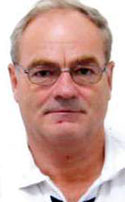Address: Roslagstullsbacken 15, SE-106 91 Stockholm, Sweden
Web page: http://www.theochem.kth.se/
Contact person: Professor Hans Ågren, phone: +46 (0)8 553 784 16
The department was formed in 2000, and consists of several research groups. Prof. Hans Ågren heads the research group on Photonics, that plays a critical role in the emergence of the information society. In this technology photons play the same role as electrons in electronics, and form the basis for new products like UV-lasers, 3D ultra-compact storage devices, opto-electronic conductors, wave-guides, switches and displays. In order to predict new materials with certain photonic properties it is essential to master and simulate the basic photon-matter interaction.
South Asia related research at the department
 In December 2009, Prof. Hans Ågren received SEK 670 000 as an International Collaborative Research Grant from the Swedish Research Links programme (funded by Sida and the Swedish Research Council) for a India related project titled ”Multiplexed immuno and DNA-based diagnosis of tuberculosis”. The project was carried out in collaboration with Associate Professor Chandrabhas Narayana at the Chemistry and Physics of Materials Unit, Jawaharlal Nehru Centre for Advanced Scientific Research in Bangalore, India. More information in Swedish.
In December 2009, Prof. Hans Ågren received SEK 670 000 as an International Collaborative Research Grant from the Swedish Research Links programme (funded by Sida and the Swedish Research Council) for a India related project titled ”Multiplexed immuno and DNA-based diagnosis of tuberculosis”. The project was carried out in collaboration with Associate Professor Chandrabhas Narayana at the Chemistry and Physics of Materials Unit, Jawaharlal Nehru Centre for Advanced Scientific Research in Bangalore, India. More information in Swedish.
Project abstract: The researchers aims to launch an Indo-Swedish network to research new technology for early-stage diagnosis of tuberculosis. They will develop a detection strategy that involves capture of bacterial DNA from urine samples with the help of DNA quenchers comprising gold nanorods and quantum dots tagged to sequence specific oligonucleotides, with the potential for identifying few copies of TB DNA.
The presence of a Raman reporter, giving surface enhanced resonant Raman scattering on the target specific oligonucleotide will be used as a confirmative assay for the presence of TB bacilli. In an alternative strategy, the researchers will detect serum antibodies that are specific to M. tuberculosis but not to saprophytic mycobacteria or to BCG, the common mycobacterial strain used for tuberculosis vaccine. They will select a battery of 10-12 individual bacterial antigens without cross reactivity with BCG and that between them cover the range of diverse forms of bacterial infection.